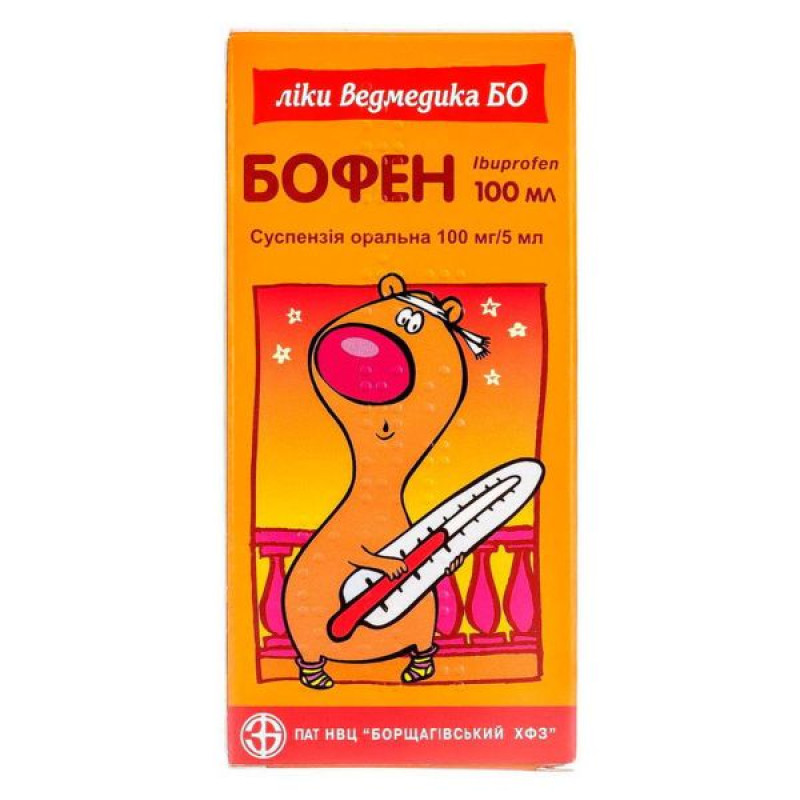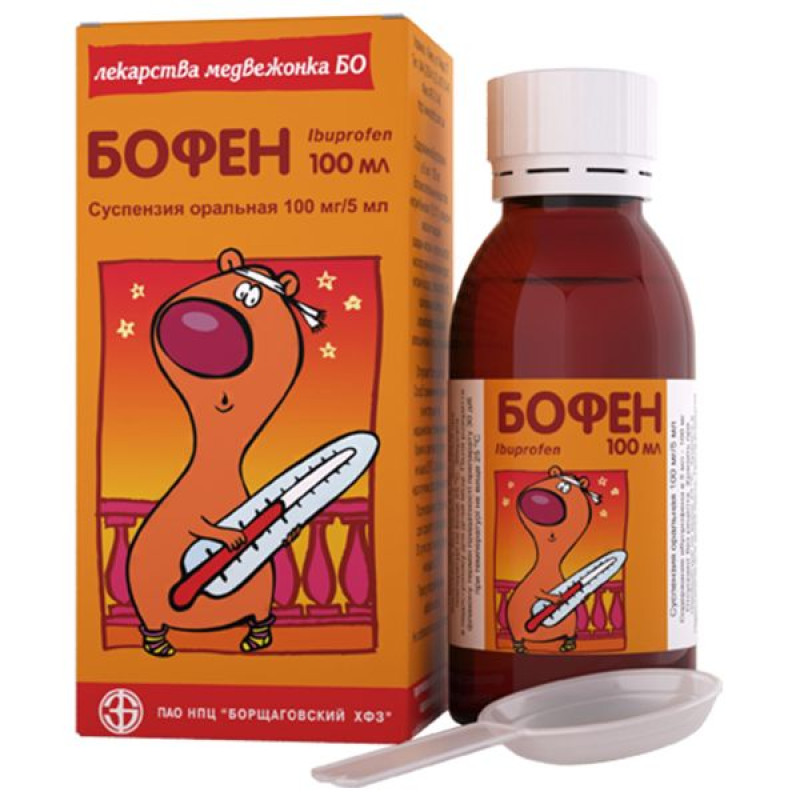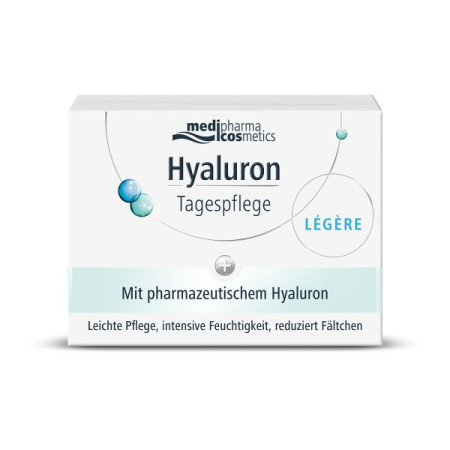Bofen oral suspension 100 mg/5 ml 100 ml bottle

Pharmacological properties
Pharmacodynamics. The drug has antipyretic, anti-inflammatory and analgesic effects. The mechanism of action is to inhibit the synthesis of prostaglandins - mediators of temperature reaction, inflammation and pain.
Pharmacokinetics. After oral administration, ibuprofen is absorbed in the gastrointestinal tract; the effect develops after a short period of time and lasts up to 8 hours.
Indication
Symptomatic treatment of fever of various origins in children aged 3 months (with a body weight of at least 5 kg) to 12 years, including after immunization, acute respiratory viral infections, influenza; headache, toothache, sore throat, pain during teething, after tooth extraction, when spraining ligaments and other types of pain, including inflammatory genesis.Application
For short-term use.
The suspension should be shaken before each use.
The dose depends on the age and body weight of the child. The daily dose is 20-30 mg/kg of the child's body weight. A single dose should be 5-10 mg/kg of body weight.
The maximum daily dose should not exceed 30 mg/kg body weight.
For fever and pain, use:
in children aged 3-6 months - 2.5 ml of suspension (50 mg) every 8 hours, but not more than 3 times a day, the daily dose is 7.5 ml (150 mg); 6-12 months - 2.5 ml of suspension (50 mg) every 6-8 hours, but not more than 4 times a day, the daily dose is 10 ml (200 mg); from 1 year to 3 years - 5 ml of suspension (100 mg) every 8 hours, but not more than 3 times a day, the daily dose is 15 ml (300 mg); 4-6 years - 7.5 ml of suspension (150 mg) every 8 hours, but not more than 3 times a day, the daily dose is not more than 22.5 ml (450 mg); 7-9 years - 10 ml of suspension (200 mg) 3 times a day (600 mg/day); 10-12 years - 15 ml of suspension (300 mg) 3 times a day (900 mg/day).For fever after immunization, use:
in children aged 3-6 months - 2.5 ml (50 mg), if necessary - another 2.5 ml (50 mg) every 6 hours, but not more than 5 ml (100 mg) within 24 hours.
The duration of treatment depends on the course of the disease and is usually 3 days. If the fever does not go away within 3 days, you should consult a doctor.
If symptoms persist for more than 24 hours after the onset of illness in children aged 3-6 months, you should consult a doctor immediately.
Contraindication
Hypersensitivity to ibuprofen or to any of the excipients; hypersensitivity to acetylsalicylic acid or other NSAIDs; concomitant use with other NSAIDs, including selective COX-2 inhibitors; active or recurrent gastric ulcer/bleeding in history (two or more severe episodes of ulcer or bleeding); hypersensitivity reactions (e.g., barium, rhinitis, angioedema or urticaria) previously reported after taking ibuprofen, acetylsalicylic acid or other NSAIDs; disorders of blood formation or blood clotting; cerebrovascular or other bleeding; history of gastrointestinal bleeding/perforation associated with previous NSAID therapy; severe hepatic or renal impairment; heart failure; hearing loss; hereditary fructose intolerance.Side effects
Immune system: hypersensitivity reactions, including skin rash, urticaria and itching; non-specific allergic reactions; anaphylactoid / anaphylactic reactions, including swelling of the face, tongue, larynx, Quincke's edema with shortness of breath, tachycardia, hypotension, anaphylactic shock; urticaria, exacerbation of urticaria symptoms, bronchospasm; aseptic meningitis with stiffness of the occipital muscles, headache, nausea, vomiting, fever, disorientation - usually in patients with existing autoimmune diseases (such as systemic lupus erythematosus, diffuse connective tissue diseases).
Blood and lymphatic system: hematopoietic disorders (anemia, including hemolytic, aplastic anemia, decreased hematocrit and hemoglobin levels, leukopenia, thrombocytopenia with / without purpura, pancytopenia, neutropenia, agranulocytosis, eosinophilia), hematomas, reversible platelet aggregation, pulmonary eosinophilia. First signs: fever, sore throat, erosions of the oral mucosa, flu-like symptoms, feeling of increased fatigue, bleeding, including from the nose, ecchymosis, menorrhagia. With prolonged therapy with ibuprofen, the blood picture should be monitored.
Skin and subcutaneous tissue: rash (including maculopapular), exfoliative and bullous dermatitis (Stevens-Johnson syndrome, erythema multiforme and toxic epidermal necrolysis), purpura, skin peeling, alopecia, photosensitivity, increased sweating. In exceptional cases, skin infections and soft tissue complications are possible during the course of chickenpox.
Digestive system: nausea, vomiting, changes in appetite (including anorexia), feeling of discomfort or pain in the epigastrium, dyspepsia, diarrhea, dry mouth, flatulence, constipation; heartburn, glossitis, esophagitis, gastritis, duodenitis, erosive-ulcerative lesions of the gastrointestinal tract (including ulcerative stomatitis, gastric ulcer), perforation or gastrointestinal bleeding (including rectal bleeding), melena, hematemesis, sometimes fatal, exacerbation of ulcerative colitis and Crohn's disease, pancreatitis.
Nervous system: headache, convulsions, dizziness, confusion, malaise, increased fatigue, emotional lability, irritability, nervousness, depression, drowsiness, paresthesias, insomnia, anxiety, psychomotor agitation, cerebrovascular complications, hallucinations, coma.
Human anatomical models: cystitis, dysuria, possible renal dysfunction with the development of hyperkalemia, hyperuricemia, azotemia, decreased creatinine clearance, oliguria/polyuria, edema, acute renal failure (especially in patients with pre-existing significant renal dysfunction), tubular necrosis, papillary necrosis (especially with prolonged use, associated with increased blood urea levels), toxic nephropathy in various forms, including interstitial nephritis, glomerulonephritis, nephritic syndrome, nephrotic syndrome, hematuria, proteinuria.
Cardiovascular system: fluid retention, edema, hypotension, hypertension, palpitations, arrhythmias (including sinus tachycardia/bradycardia), heart failure, usually in patients with impaired cardiac function, arterial thrombosis (myocardial infarction or stroke).
Sense organs: tinnitus, hearing impairment, hearing loss, vertigo, toxic optic neuritis, blurred vision, decreased vision, scotoma, toxic amblyopia, diplopia, change in color perception, conjunctivitis, dry mucous membranes of the eyes.
Others: changes in the endocrine system and metabolism, respiratory depression, apnea, non-cardiogenic pulmonary edema, pneumonia, alveolitis, rhinitis.
Bofen should be discontinued if any adverse reactions occur and a doctor should be consulted immediately.
Special instructions
To reduce the risk of adverse reactions, the minimum effective dose should be used for the minimum period necessary to eliminate the symptoms of the disease.
Ibuprofen may mask signs of infection.
It is recommended to avoid the use of ibuprofen in the presence of chickenpox due to the possibility of severe skin infections and soft tissue complications.
The use of nonsteroidal anti-inflammatory drugs, including ibuprofen, can provoke bronchospasm, attacks of bronchial asthma, swelling of the nasal mucosa in patients with bronchial asthma, chronic obstructive respiratory diseases, allergic diseases or with a history of these diseases. Severe acute hypersensitivity reactions, including anaphylactic shock, are observed less often. At the first signs of hypersensitivity reactions, the use of the drug Bofen should be discontinued.
Caution when using ibuprofen is necessary for people:
with systemic lupus erythematosus and other diffuse connective tissue diseases due to an increased risk of developing aseptic meningitis as a manifestation of hypersensitivity reactions. Aseptic meningitis has also been observed in patients who did not have these chronic diseases; with a severe allergic history due to an increased risk of hypersensitivity reactions; with hepatic dysfunction - increased blood pressure and / or heart failure in impaired liver function may progress and / or fluid retention may occur.Patients with arterial hypertension and/or a history of mild to moderate congestive heart failure should be cautious when initiating long-term treatment (consultation with a doctor is necessary), since, as with other NSAIDs, fluid retention, hypertension and edema have been reported with ibuprofen therapy.
Patients with uncontrolled hypertension, congestive heart failure, stable coronary artery disease, peripheral arterial disease and/or cerebrovascular disease should only be prescribed ibuprofen after careful benefit/risk assessment.
The risk of gastrointestinal bleeding, perforation, ulceration increases with increasing doses of NSAIDs in patients with a history of gastric ulcer, especially if complicated by bleeding or perforation, and in elderly patients. These patients should start treatment with minimal doses. Caution should be exercised when treating patients receiving concomitant medications that may increase the risk of gastrotoxicity or bleeding, such as oral corticosteroids or anticoagulants (warfarin), or antiplatelet agents (e.g. acetylsalicylic acid). In long-term treatment for these patients, as well as for patients who require concomitant use of low doses of acetylsalicylic acid or other drugs that may increase the risk of gastrointestinal side effects, the physician should consider prescribing combination therapy with misoprostol or proton pump inhibitors. Patients with a history of gastrointestinal disorders, especially the elderly, should be informed of any unusual gastrointestinal symptoms (predominantly bleeding), especially gastrointestinal bleeding at the beginning of treatment. In the event of gastrointestinal bleeding or ulceration in patients receiving ibuprofen, treatment should be discontinued immediately.
Ibuprofen, like other NSAIDs, can affect platelet aggregation and prolong bleeding time in healthy people.
Ibuprofen should be used with caution in patients with significant dehydration.
Taking nonsteroidal anti-inflammatory drugs can lead to nephrotoxicity, a dose-dependent decrease in prostaglandin synthesis and provoke the development of renal failure due to impaired renal blood flow. Such patients should be monitored for renal function. After discontinuation of NSAID therapy, renal function is usually restored.
Serious skin reactions, including exfoliative dermatitis, Stevens-Johnson syndrome, and toxic epidermal necrolysis, some of which were fatal, have been reported very rarely with NSAIDs. In most cases, these reactions occurred in patients within the first month of treatment. Bofen should be discontinued at the first appearance of skin rash, mucosal lesions, or any other sign of hypersensitivity.
Do not exceed recommended doses.
Children. The drug is used in children aged 3 months (with a body weight of at least 5 kg) to 12 years in the doses indicated in the APPLICATION section.
Pregnancy and breastfeeding. The drug is used only in children under 12 years of age.
The ability to influence the reaction rate when driving or working with mechanisms. The drug is used only in children under 12 years of age.
Interactions
Ibuprofen, like other nonsteroidal anti-inflammatory drugs, should not be used in combination with:
acetylsalicylic acid: this may increase the risk of adverse reactions, unless prescribed by a doctor (dose not exceeding 75 mg/day);
sulfonylurea drugs and phenytoin: possible enhancement of the effect;
Anticoagulants: NSAIDs may enhance the effects of anticoagulants such as warfarin;
lithium: an increase in their levels in blood plasma is possible due to a decrease in renal excretion of these drugs;
methotrexate: a decrease in the tubular secretion of methotrexate is possible, thereby increasing its concentration in the blood and hematotoxicity;
Antihypertensive drugs (ACE inhibitors and angiotensin II antagonists) and diuretics: possible weakening of their effect. In some patients with impaired renal function (e.g. with dehydration or in elderly patients with compromised renal function), the simultaneous use of ACE inhibitors or angiotensin II antagonists and drugs that inhibit COX may lead to further deterioration of renal function, including possible AKI, which is usually reversible. Therefore, such combinations should be prescribed with caution, especially in elderly patients. If long-term treatment is necessary, the patient should be adequately hydrated and consideration should be given to monitoring renal function at the beginning of combined treatment, as well as periodically thereafter. Diuretics may increase the risk of nephrotoxicity of NSAIDs;
corticosteroids (including corticosteroids): may increase the risk of adverse reactions, especially the formation of gastrointestinal ulcers and bleeding;
cardiac glycosides (including digoxin): may exacerbate heart failure, reduce glomerular filtration rate and increase the level of glycosides in blood plasma;
antiplatelet agents and selective serotonin inhibitors: the risk of gastrointestinal bleeding may increase;
calcineurin inhibitors (cyclosporine, tacrolimus): NSAIDs increase the nephrotoxicity of these drugs due to their effect on renal prostaglandins;
mifepristone: NSAIDs should not be taken for 8-12 days after using mifepristone, as this may lead to a decrease in the severity of the latter's effect;
zidovudine: increased risk of hemarthroses and hematomas in HIV-infected patients receiving concomitant treatment with zidovudine and ibuprofen;
quinolone antibiotics: possible increased risk of seizures;
Aminoglycosides: NSAIDs may reduce the excretion of aminoglycosides;
Cholestyramine: with simultaneous administration, a decrease in the absorption of ibuprofen in the gastrointestinal tract is possible. The clinical significance is unknown;
antidepressants, clopidogrel, prasugrel, heparin, pentoxifylline, herbal extracts (e.g. ginkgo biloba): possible increased risk of bleeding when used with nonsteroidal anti-inflammatory drugs, including ibuprofen;
CYP 2C9 inhibitors: possibility of pharmacokinetic interaction - increased exposure to ibuprofen (CYP 2C9 substrate). A dose reduction of ibuprofen should be considered when co-administered with potent CYP 2C9 inhibitors (such as voriconazole, fluconazole), especially at high doses of ibuprofen;
aliskiren, α-adrenergic blockers, β-adrenergic blockers, calcium channel blockers, clonidine, methyldopa, nitrates: NSAIDs reduce their hypotensive effect.
Overdose
Use in children in doses above 400 mg/kg body weight may lead to symptoms of intoxication. The half-life in case of overdose is 1.5-3 hours.
Symptoms depend on the amount of the drug taken and the time elapsed since ingestion, but individual reactions cannot be ruled out. In most cases, abdominal pain, nausea, vomiting, diarrhea. Ringing in the ears, lethargy, drowsiness, headache, and gastrointestinal bleeding are also possible.
In moderate poisoning, the following symptoms of neurotoxicity are noted: dizziness, lethargy, respiratory depression/apnea, cyanosis, shortness of breath, nystagmus, visual disturbances, sometimes agitation, convulsions, disorientation, loss of consciousness, coma.
In severe poisoning - significant arterial hypotension, bradycardia / tachycardia, atrial fibrillation, hyperkalemia, metabolic acidosis, possible prolongation of prothrombin time, acute renal failure, liver damage. In patients with bronchial asthma, exacerbation of symptoms is possible.
Treatment should be symptomatic and supportive, and include ensuring a patent airway. Gastric lavage (only within 1 hour after ingestion), activated charcoal, alkaline drinking, and forced diuresis are recommended. In case of frequent or prolonged muscle spasms, treatment should be carried out with the administration of diazepam or lorazepam. In case of asthma, bronchodilators should be used. Monitoring of cardiac activity and vital signs is necessary to stabilize the patient's condition. Hemodialysis is ineffective.
Storage conditions
At a temperature not exceeding 25 °C.
After opening the bottle, the shelf life of the drug is 30 days at a temperature not exceeding 25 °C.
There are no reviews for this product.
There are no reviews for this product, be the first to leave your review.
No questions about this product, be the first and ask your question.
















